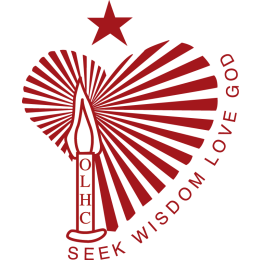
Our Lady Help of Christians Rosemeadow
A Catholic Parish Primary School
 Students experience formal religious education each day based upon the K-12 Religious Education Curriculum of the Diocese of Wollongong.
Students experience formal religious education each day based upon the K-12 Religious Education Curriculum of the Diocese of Wollongong.
The formation of Christian values underpins all that we do at Our Lady Help of Christians, and students also experience formal Religious Education lessons each day based upon the K-12 Religious Education curriculum of the Diocese of Wollongong.
Religious Education (RE) is one of our Key Learning Areas. The RE curriculum is set by the Bishop of Wollongong in conjunction with Catholic Education Diocese of Wollongong.
The Emmaus Story (Luke 24:13-35) is central to the Religious Education curriculum. The curriculum is based on the four movements of the Emmaus story.
The Religious Education curriculum aims to assist students to reflect upon, make sense of, celebrate and live more deeply the mystery of Christ. Relationship with God is nurtured through catechesis, prayer and ritual enabling/supporting students to contribute positively to the community and culture. The content strands and themes of learning aim to lead students towards love of God, love for others and for all of creation as they become open to the presence and activity of God in their lives.
Explicitly for RE, the teaching and learning process should incorporate storytelling and creative arts, and foster the development of the four cognitive processes of Religious Literacy:
One of the aims of Religious Education (RE) in our Catholic schools is to develop our students' ‘Religious Literacy’ – that is, the way children use their literacy skills to communicate their understanding of the religious tradition to themselves, their peers, teachers and members of the wider faith community.
“By the end of their schooling students know the core teachings of our faith, our Scriptures, history and tradition and how these are to be lived in the world" — Catholic Schools at a Crossroad (2007)
The Religious Literacy Assessment program in the Diocese of Wollongong provides information about the way children process and express their religious knowledge. The assessment involves all Year 4 students across the diocese and consists of a multiple choice paper, focusing on the students' knowledge and understanding of the key concepts that are taught throughout their Religious Education from Kindergarten to Year 4, and what this means for the way we live, as it is applied in society.
The tasks are developed around the Religious Literacy Framework of Knowing the Tradition, Working with the Tradition, Applying the Tradition and Valuing the Tradition, reflecting Stage 1 and Stage 2 outcomes of the RE curriculum. The data gathered from the assessment is analysed to inform learning and teaching in schools, to focus on professional learning and to recognise and celebrate learning in the domain of Religious Education in the Wollongong Diocese.